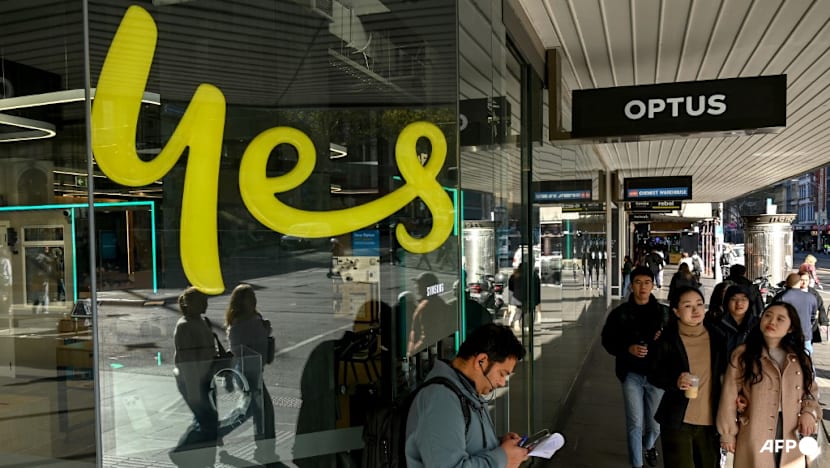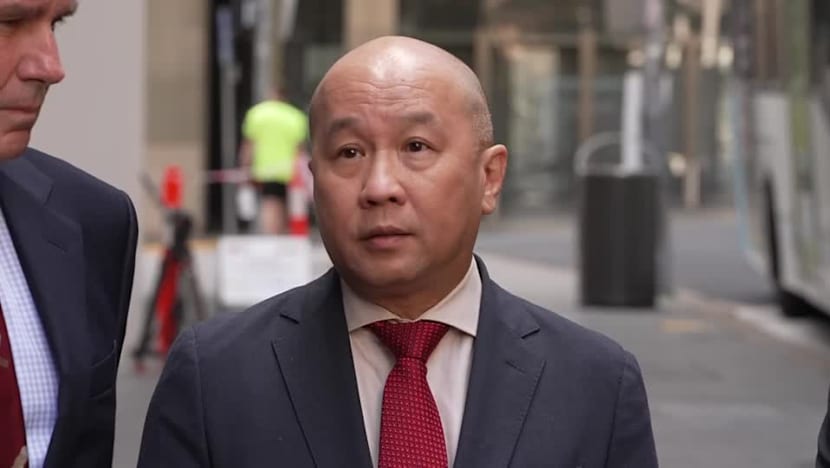Commentary: Why is Singtel still holding on to troubled Aussie telco Optus?
Singtel unit Optus is under growing scrutiny after two back-to-back disruptions to Australia’s “000” emergency call system, says former editor and financial journalist Ven Sreenivasan.

People pass by an Optus store in Melbourne on Sep 22, 2025. The Australian government said Sep 20 that telco firm Optus "let Australians down" after several people died during a network outage that prevented calls to emergency services. (Photo: AFP/William West)

This audio is generated by an AI tool.
SINGAPORE: When it rains, it sometimes pours. And for Singtel’s Australian unit, Optus, it has been a virtual deluge in recent years.
The latest fiasco at Australia’s second-largest telco occurred on Sep 28, when it suffered an outage that disrupted critical “000” emergency calls to police, fire departments and ambulance services. The episode impacted some 4,500 customers and all calls made between 3am and 12.30pm.
The Sep 28 incident was just the latest in a string of mishaps to afflict Optus, which is wholly owned by Singtel.
Ten days earlier, on Sep 18, another outage left emergency calls offline for nearly 14 hours across South Australia, Western Australia and the Northern Territory, affecting 600 people. Four deaths have been linked to the outage. While direct correlation remains unverified, the fact that people were unable to reach emergency services at all is deeply troubling.
To make matters worse, it later emerged that Optus had notified the wrong government email address about the outage. As a result, federal agencies were left unaware for more than a day.
While all that was unfolding and as public anger grew, Optus was also served an A$100 million (US$65 million) fine for what a federal court called “appalling” sales tactics. Between 2019 and 2023, it sold unnecessary products to vulnerable customers - some of whom were deaf or had a mental or learning disability.
Australia’s Communications Minister Anika Wells has said that Optus can expect “more significant fines” for the recent outages.
PROBLEM CHILD
Optus has been one of Singtel’s prized overseas assets since it was acquired in 2001 for about S$11 billion (US$8.5 billion). Other key Singtel investments include associates Bharti Airtel in India, AIS in Thailand and Telkomsel in Indonesia.
These investments are important for Singtel, which faces a small and crowded home market in Singapore. Together, Singtel’s offshore investments account for almost 10 per cent of Singtel’s pre-tax profit. While the numbers may seem small for now, the growth has been in double-digit percentages.
That said, Optus has been somewhat of a “problem child” for Singtel.
Last year, Optus was fined A$12 million by regulators for failing to provide emergency call services to thousands during a nationwide outage in 2023. Optus also suffered a cyberattack in 2022 that affected the data of up to 10 million Australians.
Former CEO Kelly Bayer Rosmarin resigned in the wake of the earlier incidents, and current chief executive Stephen Rue took over in November 2024. There is speculation in the market that Mr Rue may also not last at the job if another crisis hits.
The latest fiasco has had Singtel CEO Kuan Moon Yuen scrambling to apologise to customers and the Australian public.
During Singapore Prime Minister Lawrence Wong’s summit with his Australian counterpart earlier this month, Mr Wong extended his condolences to families affected by the Optus outages, saying that he expected Optus and Singtel to act responsibly, comply fully with Australian laws and cooperate with the ongoing inquiry.
STAY OR GO?
As Maybank Securities analyst Hussaini Saifee puts it, the latest Optus saga presents a reputational risk for Singtel, especially given the fatalities. Critics have also questioned whether Singtel exercises sufficient oversight over Optus.
Beyond reputational issues, Optus’ performance has also been somewhat mixed. Optus accounts for about 15 per cent of Singtel's “sum-of-the-parts” (SoTP) valuation, but contributes less than Singtel’s other regional associates like India’s Bharti.
There has been persistent speculation that Singtel has been looking to offload Optus. Last year, there were reports of a potential sale for some A$16 billion to Canadian private equity group Brookfield. Singtel has denied these reports. Calls within the market to offload Optus have resurfaced again after the most recent incidents.
So should Singtel bail out of Optus?
Analysts like Maybank Securities’ Mr Hussaini say that while the full impact of the latest events remains uncertain, they estimate under a conservative scenario, there could be a 5 per cent decline in Optus mobile revenue for FY27, no margin growth until FY28, a 2 to 3 percentage points increase in capex intensity, and A$200 million in provisions. Under these assumptions, Maybank Securities estimates that Singtel Group’s FY28 earnings and SoTP valuation could decrease by 5 to 6 per cent.

That said, Optus remains strategically important for Singtel. Despite the volatility in its share price since the recent incidents, analysts have maintained their “buy” on Singtel.
It is Australia's second-largest operator, is operationally improving, and has seen heavy network investments over the past decade. As a wholly owned subsidiary, it contributes around half of Singtel's consolidated revenue, though it lags behind other regional associates in terms of profit contribution.
The latest Optus incident has forced minds at Singtel in Singapore and Optus in Australia to focus on the shortcomings that led to the latest debacle, and various other incidents in recent years. In the wake of what happened last month, management at both Singtel and Optus have also reaffirmed their long-term commitment to improve quality of service and efficiency of operations.
Meanwhile, Australian media reports of under-investment appear overstated as Optus has consistently managed a capital expenditure of almost 20 per cent to sales over the last 10 years.
But there is no denying that what happened last month was a serious stumble. The outages should not have happened. Lives should not have been lost. Events could have been better handled. Lessons must be learnt, and are - hopefully - being learnt.
History suggests that if the right things are done, and things are done right, customer confidence could return in about three months.
In the meantime, there is no real pressure, or need, for Singtel to sell out of Optus. The task ahead for Optus - and by extension, Singtel - is to work hard to rebuild customer confidence in Australia.
Ven Sreenivasan is a former editor and journalist who has covered financial markets, economic and corporate news and aviation for more than 30 years.

















